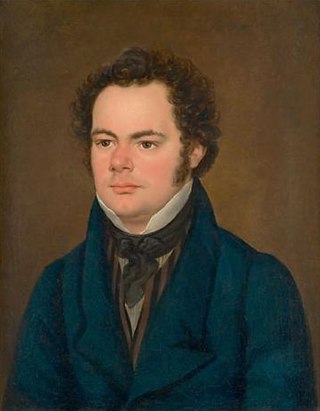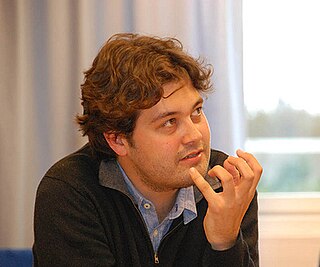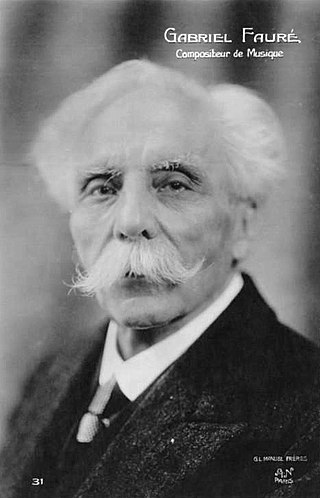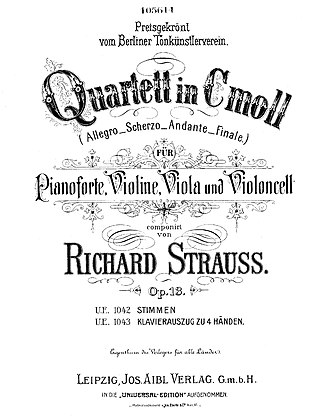
The term string quartet refers to either a type of musical composition or a group of four people who play them. Many composers from the mid-18th century onwards wrote string quartets. The associated musical ensemble consists of two violinists, a violist, and a cellist. The double bass is almost never used in the ensemble mainly because it would sound too loud and heavy.
The Takács Quartet is a string quartet founded in Budapest, Hungary, and now based in Boulder, Colorado, United States.

Franz Schubert's final chamber work, the String Quintet in C major is sometimes called the "Cello Quintet" because it is scored for a standard string quartet plus an extra cello instead of the extra viola which is more usual in conventional string quintets. It was composed in 1828 and completed just two months before the composer's death. The first public performance of the piece did not occur until 1850, and publication occurred three years later in 1853. Schubert's only full-fledged string quintet, it has been praised as "sublime" or "extraordinary" and as possessing "bottomless pathos," and is generally regarded as Schubert's finest chamber work as well as one of the greatest compositions in all chamber music.
Antonín Dvořák's String Quintet No. 2 in G major, Op. 77 (B. 49), was originally composed in early March 1875 and first performed on March 18, 1876 in Prague at the concert of the Umělecká beseda.

The String Octet in E-flat major, Op. 20, MWV R 20, was written by the 16-year-old Felix Mendelssohn during the fall of 1825 and completed on October 15. Written for four violins, two violas, and two cellos, this work created a new chamber music genre. Conrad Wilson summarizes much of its reception ever since: "Its youthful verve, brilliance and perfection make it one of the miracles of nineteenth-century music." This was one of the first works of Mendelssohn to be very well received.

Quintet in E-flat for Piano and Winds, Op. 16, was written by Ludwig van Beethoven in 1796.
The six String Quartets, Op. 76, by Joseph Haydn were composed in 1797 or 1798 and dedicated to the Hungarian count Joseph Georg von Erdődy (1754–1824). They form the last complete set of string quartets that Haydn composed. At the time of the commission, Haydn was employed at the court of Prince Nicolaus Esterházy II and was composing the oratorio The Creation as well as Princess Maria Hermenegild Esterházy's annual mass.
The String Quartet No. 2 in A minor, Op. 13, was composed by Felix Mendelssohn in 1827. Written when he was 18 years old, it was, despite its official number, Mendelssohn's first mature string quartet. One of Mendelssohn's most passionate works, the A minor Quartet is one of the earliest and most significant examples of cyclic form in music.
The String Quintet No. 2 in C minor, K. 406/516b, was written by Wolfgang Amadeus Mozart in 1787. Like all of Mozart's string quintets, it is a "viola quintet" in that it is scored for string quartet and an extra viola. Unlike his other string quintets, however, the work was not originally written for strings. Having completed the two string quintets K. 515 and K. 516, Mozart created a third by arranging his Serenade No. 12 for Winds in C minor K. 388/384a, written in 1782 or 1783 as a string quintet. Although by then Mozart was entering each new work into his catalogue of compositions, he did not enter this quintet, perhaps because it was an arrangement rather than a new work.
The String Quintet in C minor, Op. 104, written by Ludwig van Beethoven in 1817, performed on 10 December 1818, and published in 1819, is an arrangement of the early C minor Piano Trio, Op. 1 No. 3. This work is scored for a string quintet with two violas.
Sergei Prokofiev wrote the Overture on Hebrew Themes, Op. 34, in 1919 while he was in the United States. It is scored for the rare combination of clarinet, string quartet and piano. Fifteen years later the composer prepared a version for chamber orchestra, his “Op. 34 bis” or Op. 34a, retaining a separate part for piano but featuring solo cello as much as solo clarinet.

Lawrence Power is a British violist, born 1977, noted both for solo performances and for chamber music with the Nash Ensemble and Leopold String Trio.
The String Quartet in E minor, Op. 83, was one of three major chamber music works composed by Sir Edward Elgar in 1918. The others were the Violin Sonata in E minor, Op. 82, and the Piano Quintet in A minor, Op. 84. Along with the Cello Concerto in E minor, Op. 85 of 1919, these were to be his last major works prior to his death in 1934.

The String Quartet in E minor, Op. 121, is the only string quartet by Gabriel Fauré. Completed in 1924 shortly before his death at the age of 79, it is his last composition. His pupil Maurice Ravel had dedicated his String Quartet to Fauré in 1903, and he and others urged Fauré to compose one of his own; he declined on the grounds that it was too difficult. When he finally decided to write it, he did so in trepidation.

The String Quartets, Op. 50, were composed by Joseph Haydn in 1787. The set of six quartets was dedicated to King Frederick William II of Prussia. For this reason the set is commonly known as the Prussian Quartets. Haydn sold the set to the Viennese firm Artaria and, without Artaria's knowledge, to the English publisher William Forster. Forster published it as Haydn's Opus 44. Haydn's autograph manuscripts for Nos. 3 to 6 of the set were discovered in Melbourne, Australia, in 1982.

The String Quartet in D minor, Voces intimae, Op. 56, is a five-movement chamber piece for two violins, viola, and cello written in 1909 by the Finnish composer Jean Sibelius. It is the only major work for string quartet of his mature period.

The String Quartet No. 1 in E-flat major, Op. 22, No. 1, is a chamber music work by the Romanian violinist and composer George Enescu, composed between 1916 and 1920. A performance of it lasts about 45 minutes.

The Piano Quartet in C minor, Op. 13, TrV 137, was written by Richard Strauss from 1884 to 1885. An early chamber music work of the then 20-year-old composer, it shows considerable influence from Johannes Brahms. It is scored for a standard piano quartet consisting of a piano, violin, viola, and cello. At the premiere on 8 December 1885 in Weimar, Strauss himself performed the piano part.
The Doric String Quartet is a string quartet based in the UK. It was formed in 1998. As of 2023, the members are Alex Redington and Ying Xue on violin, Hélène Clément on viola and John Myerscough on cello. Past members include Jonathan Stone, Simon Tandree and Chris Brown. In 2008, the quartet won first prize at the Osaka International Chamber Music Competition and second prize at the "Premio Paolo Borciani" International String Quartet Competition.










